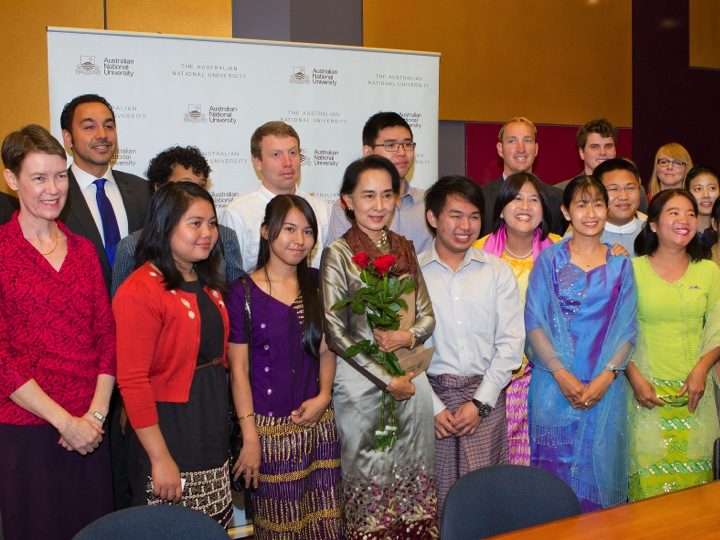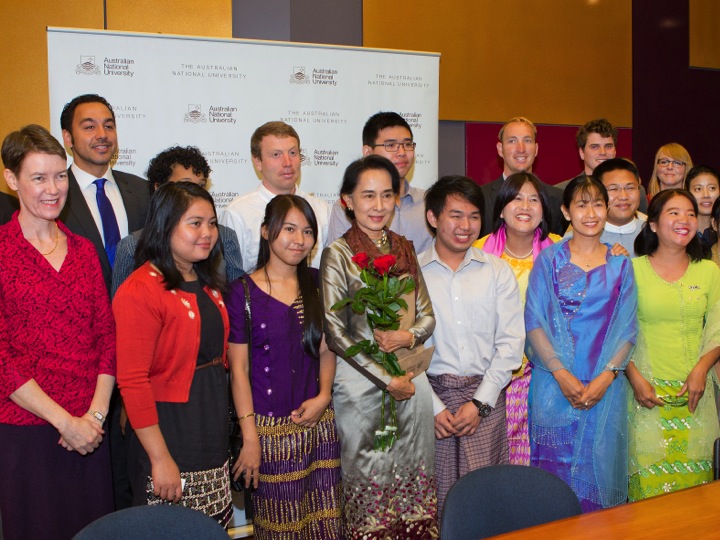On Friday, 29 November 2013, Daw Aung San Suu Kyi was awarded an honorary doctorate at the Australian National University. Before the ceremony a few students got the chance to meet with Daw Aung San Suu Kyi for a roundtable discussion. I had prepared some questions for the roundtable that I never asked. I am happy to share them with the New Mandala audience. Perhaps someone else has got an answer to them?
Questions for Daw Aung San Suu Kyi
You have said many times that your country both wants and needs the rule of law and there seems to be much optimism about rule of law assistance at the moment as international donors are initiating or undertaking various projects and programmes in this field. To name a few, the International Bar Association wants to fund a project that seeks to establish a professional, independent and active bar association, New Perimeter (DLA Piper’s pro bono legal assistance organization) is delivering clinical legal education workshops, The World Justice Project is supporting legal professionals, and The United States Agency for International Development is contracting out interventions to promote and protect the “rule of just law”.
This could be a good thing, however, donors seem to be following the same procedures as always and in other settings these have not always been successful. Instead new laws and institutions have been described as being based on concepts or models that are “too foreign” and that do not fit in very well with the national or local context, resulting in law “on paper” and institutions that no one uses. How do you think some of the rule of law development mistakes as seen in other developing and transitional settings, can be prevented from happening in your country?
I also have a question on what the rule of law means for you if you think that it is necessary to reach an agreement with international donors on what the rule of law means in the specific context you are in? Foreign actors have suggested that there is no broad understanding of what the rule of law means in your country, do you see any problems with such statements? Is the rule of law an international concept or are there local legal cultures and values in your country that could influence how a rule of law system will look like in the future?
In relation to this, I am also interested in knowing how you think the government will respond to foreign interventions into law and justice? Do you think that international donors and national actors can reach a compromised agreement on what activities are the most suitable ones for rule of law development in your country?
How do you for example balance potential international pressure for a focus on “hot topics” such as prosecution of war crimes against less “hot topics” such as rule of law reform within public administration? Or between rushed and slower more grounded reforms? It has for example been suggested that there are serious problems of capacity to accept rule of law assistance from the international community and that national lawyers lack capacity to absorb outside help in your country, still rule of law donors want to support several development initiatives. What are your views on such statements and do you think that there will be too much pressure to accept outside involvement in the development process?
Kristina Simion holds a LLM from Stockholm University, specialising on law and development, customary justice, and comparative law. She has worked as a Rule of Law Officer for the Swedish Agency for Peace, Security and Development, the Folke Bernadotte Academy, where she was involved in various research projects on rule of law development. She is currently undertaking PhD studies at the Regulatory Institutions Network at the ANU looking at rule of law assistance.
 Facebook
Facebook  Twitter
Twitter  Soundcloud
Soundcloud  Youtube
Youtube  Rss
Rss 
